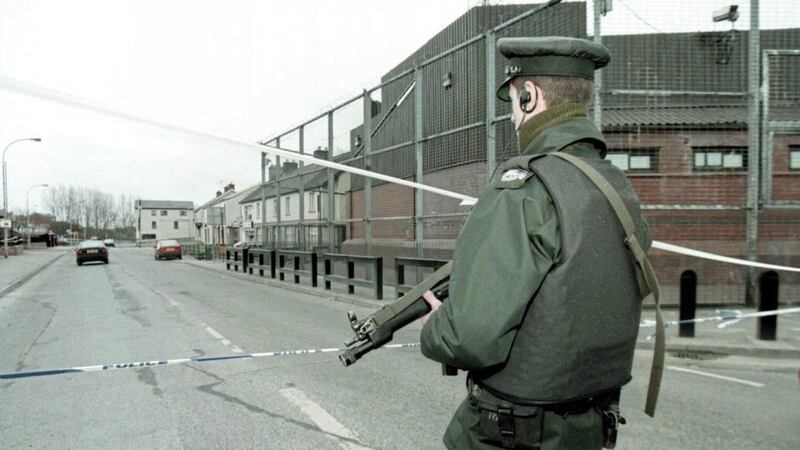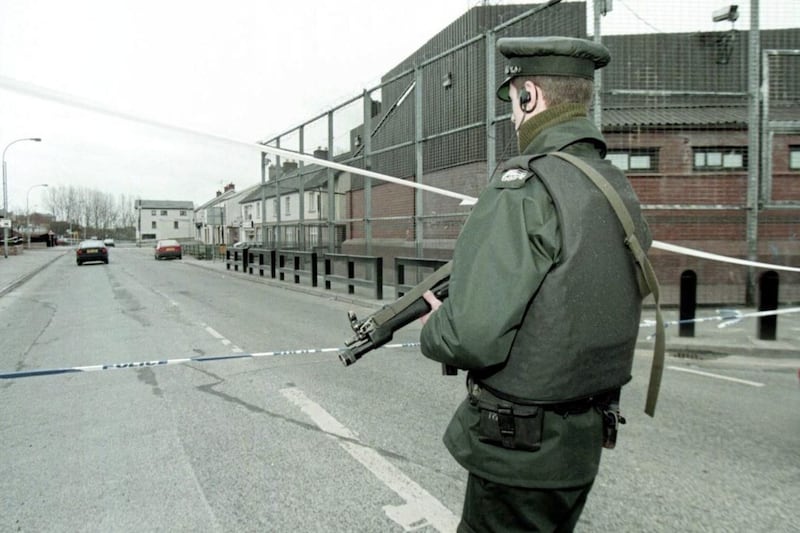BEING honest, I had mixed feelings about reviewing a book which was reported as being favourable towards the RUC and that was written by a former RUC officer.
The famous American journalist and broadcaster Edward Murrow once wrote: "Everyone is a prisoner of their own experiences. No-one can eliminate prejudices - just recognise them."
I was raised amidst the Troubles in the border town of Newry. Local relationships with the then RUC were at best fractured or at worst non-existent.
This book - subtitled The Last Shift and the final instalment of Colin Breen's A Force Like No Other trilogy which has set out the 'real stories from the RUC men and women who policed the Troubles' - contains quite a few anecdotes about Newry.
One quotes a former RUC Assistant Chief Constable claiming there were three divisions to the RUC - Belfast, 'the country' and Newry.
I fully recognised that my early experiences of policing could make me a prisoner of my own prejudices when reading this book.
To start with, I did not see the RUC as a proper police service. I still don't believe it was - despite many, many good people serving in it.
Unusually for someone growing up in Newry, one of our neighbours was an RUC officer. He was Catholic and his sons were ahead of me at school. His daughter and I were friends. His name was Neal Quinn.
He was shot drinking in a local pub - the same pub often frequented by the late MP Seamus Mallon. According to police statistics he was the 100th RUC member killed.
Time has dulled my memory but I recall Mr Quinn as a kindly man and a good father.
In dealing with our own experiences and prejudices we can sometimes forget the human impact of conflict. The hurt, the bereaved and the heartbreak of families left behind. As they say, bullets pass through time as well as bodies.
Colin Breen, the instigator of the A Force Like No Other trilogy, attempts to bridge the information gap (or ignorance) by gathering and sharing the thoughts, memories and experiences of former RUC officers.
He takes the reader past the uniform and gives a glimpse of personalities, motivations and reflections of those who came forward to serve.
Strictly speaking, Breen is not the writer or even the narrator of the book - he is more of a conduit for stories of others; a curator of individual rather than collective memories of the RUC from the mouths of those who served in it.
Rather unsurprisingly, the former RUC men (and a few women) telling their stories do so with rather rose-tinted glasses. This is not a weakness of The Last Shift as it is not an analysis or critique of the RUC. That is already well documented and is why the RUC eventually had to change from a police force to a police service via the establishment of the PSNI.
Breen is really attempting to allow people to speak for themselves. He is giving a platform for voices which have been silenced, ignored or forgotten about.
A reader can sense that this is how former RUC officers actually felt and how they saw things at that time - before and during the Troubles. With so much revisionism going on within the republican narrative, it's actually refreshing to hear authentic voices from the RUC. Though at times, it is rather sugar-coated. The voices tend to suggest that it was the few rotten apples which let down the RUC.
The Last Shift, the third part of Breen's trilogy, is dedicated to the memory of the 302 RUC officers killed during the Troubles. He also points out a further 10,000 officers were injured. These are staggering figures in a place as small in Northern Ireland.
It also highlights the need for a proper legacy process which recognises the sacrifices made by many dedicated police officers - many of whom were doing the ordinary stuff of tackling crime, keeping roads safe and in the case of the late Constable Quinn, the mundane work of policing such as processing compensation claim forms.
Breen's book also contains humorous anecdotes, mostly about the arrival of senior officers at local police stations where savvy streetwise sergeants ruled the roost.
There is a sadness too which is hard to escape with so many horrific events happening during that era. Often it was the police who were first to arrive at the scene, such as the aftermath of Narrow Water which is recalled in gory details.
Clearly not all recollections are accurate - the RUC station in Newry was not the Keys Street Station but Corry Square which is now a lovely pocket park dedicated to a family of firefighters.
A Force like No Other - The Last Shift is probably going to be one of the last books of its kind. The PSNI is now in its twentieth year and it is almost unrecognisable from its predecessor, the RUC; well worth a read for those who remember the Troubles and even more so for those who don't.
::A Force Like No Other - The Last Shift: The Final Selection of Real Stories from the RUC Men and Women Who Policed the Troubles by Colin Breen is published by Blackstaff Press.



